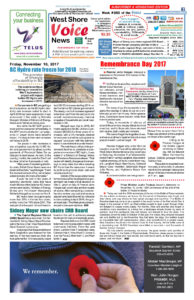ARCHIVE – BC & NATIONAL Breaking News [Nov & Dec 2017]
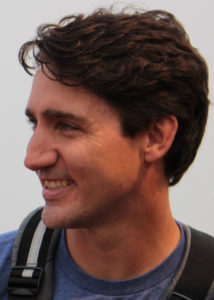
Sunday, December 31 ~ OTTAWA. Prime Minister Justin Trudeau issued a statement to mark the new year, 2018: “Happy New Year, Canada!
“This past year, we marked the 150th anniversary of Confederation, and looked back on the remarkable achievements Canadians have made throughout our history. We recommitted ourselves to our shared values, and we celebrated the diversity that makes us strong. Millions of people – of every background, origin, culture, and faith – have come together to make Canada the diverse, open, and prosperous country it is today.
“The 150th anniversary of Confederation was also a chance to reflect on the moments Canada has not lived up to its ideals. Indigenous Peoples, and many Canadians, have faced prejudice and oppression in our history. In the New Year and the years to come, we must continue to work to right these wrongs, and make sure everyone has a real and fair shot at success.
“In 2017, we made real progress toward these goals. Our government took action to build a better future for families across Canada – from taking steps to strengthen the Canada Child Benefit and investing in early learning and child care, to creating new opportunities for young people, to advancing reconciliation with Indigenous Peoples and protecting the rights of LGBTQ2 communities. We made gender equality a priority at home and abroad, and took strong steps to fight climate change and protect our environment, for generations to come. We launched Canada’s first ever National Housing Strategy and lowered the small business tax rate – and together, we continued to create jobs, grow our economy, and strengthen the middle class.
“But we still have a lot of hard work left to do. In 2018, let’s continue to celebrate the values that unite us – openness, compassion, equality, and inclusion. Let’s move forward together, put those values into practice, and work to build a better future for all of us.
“On behalf of the Government of Canada, Sophie and I wish you a wonderful night and all the best in 2018.”
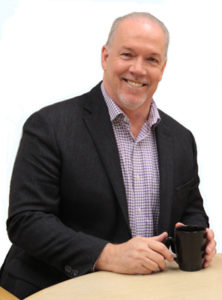
“The new year brings new beginnings and new opportunities. It is a chance to look back at the challenges we have faced, and to resolve ourselves to overcome obstacles in the year to come.
“From addressing housing affordability to tackling the opioid crisis, and the ongoing recovery from last year’s devastating wildfires, we have no shortage of important work to do in the coming year.
“On New Year’s Day we are given the opportunity to think about where we are and where we have to go. It is a day to consider the path ahead and to set our minds to meet our goals.
“In 2018, we will be working hard to create a strong, sustainable economy that benefits everyone, to make life more affordable for families and to improve the services people rely on.
“On behalf of the government of British Columbia, I wish you a safe, healthy and happy new year with many more to come.”
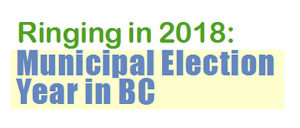 Sunday, December 30 ~ WEST SIDE of VANCOUVER ISLAND. As you ring in the new year tomorrow night, those who are politically inclined and civic minded are already well aware that 2018 is a big municipal election year in BC.
Sunday, December 30 ~ WEST SIDE of VANCOUVER ISLAND. As you ring in the new year tomorrow night, those who are politically inclined and civic minded are already well aware that 2018 is a big municipal election year in BC.
Elections BC says that the municipal and school board election period starts January 1, 2018, even though election day isn’t until October 20. That’s a lot of months of preparation for exposure to the community!
Candidates for Mayor, Council, and school trustee seats across BC may submit nomination papers starting September 4. The official campaign period begins September 22.
West Shore Voice News will in particular follow the campaign action all year in Langford, Colwood, Metchosin, Sooke, Juan de Fuca and View Royal (and school district 62 on the west shore) as candidates shuffle into place.
In our nearly 10 years of covering political and community news of this region, West Shore Voice News (formerly Sooke Voice News) election coverage has proven to get broad readership and good advertising traction.
This is the first municipal/trustee election after a 4-year term. Previously in BC, municipal and school board terms were for three years.
 Friday, December 29 ~ BC. Baby names in BC for 2017 are today’s hot topic. Final statistics will not be available until later in 2018, but stats from BC Vital Statistics (January 1 to December 15) are showing the trends.
Friday, December 29 ~ BC. Baby names in BC for 2017 are today’s hot topic. Final statistics will not be available until later in 2018, but stats from BC Vital Statistics (January 1 to December 15) are showing the trends.
The top baby girl name is Olivia (same as in 2016), with Emma in second place. For the past six years, Olivia and Emma have been the top two girls’ names. So far, the other names for girls in the top five remain Sophia, Charlotte and Ava.
So far it looks like the top baby boy name in BC this year is Benjamin, followed by Liam, Logan and Lucas. It appears Ethan and Oliver might not make it into the top five this year; possibly being replaced by Logan and James.
There were 45,399 babies born in BC in 2016 – 22,188 girls (49%) and 23,210 boys (51%). In 2016, Lucas was the number 1 boys’ name, followed by Benjamin, Ethan, Oliver and Liam. Olivia was the top girls’ name in 2016, followed by Emma, Charlotte, Ava and Sophia. List of the most popular baby names in BC for 2016

Thursday, December 28 ~ VICTORIA. The BC government is reminding party-goers who intend to use for-hire vehicles such as limousines and “party buses” to familiarize themselves with the laws and regulations that govern these vehicles, to plan ahead for a safe ride home.
Passengers should be reminded that drinking alcohol in any private or commercial vehicle is illegal in BC, whether the vehicle is moving or not.
As New Year’s Eve approaches, consumers are encouraged to look for companies that advertise strict policies related to consuming alcohol in vehicles. The Ministry of Transportation and Infrastructure has distributed over 800 decals to operators for display in their vehicles, reminding passengers that consuming alcohol in any vehicle is illegal in BC.
Operators using any size vehicles with limo-style or party bus perimeter seating must have a special authorization licence. These licences state where vehicles can operate and limit fleet size. Passengers should look for a passenger-transportation licence plate and decal on the front of the vehicle, or if there is no plate, ask to see a temporary operating permit, before boarding a bus.
Police will be monitoring limousines and party buses during the holiday season. Operators that allow the consumption of alcohol in their vehicles will be penalized, and passengers in these vehicles also have a responsibility to adhere to the Province’s liquor laws. Operators who do not comply with liquor laws run the risk of losing their licence, and minors in possession of alcohol are subject to a $230 fine.
Make sure the company you are considering is properly licensed in BC by looking it up on the Licensee Report on the Passenger Transportation Branch’s Registry at: www.th.gov.bc.ca/rpt/registry.htm
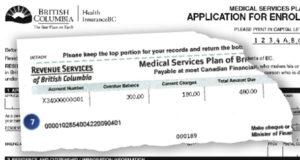
The BC Medical Services Plan billings still continue.
Wednesday, December 27 ~ VICTORIA. Medical Services Plan (MSP) premiums in BC will be cut by 50% effective January 1, 2018. The BC Government says this marks “an important step toward improving fairness for all British Columbians”.
“MSP premiums are unfair and place a significant burden on British Columbians,” said BC Finance Minister Carole James in a Ministry of Finance news release. “I’m proud that we are moving away from these regressive fees and creating a more equitable system by eliminating MSP premiums entirely within four years.”
In addition to the 50% rate cut, the income threshold for full exemption from MSP premiums under the premium assistance program will also be raised by $2,000 (up to $26,000), as of January 1, 2018.
In November 2017, the Minister of Finance established a task force to examine the best approach to replacing the revenue from eliminating MSP premiums. The task force is comprised of respected experts in economics, law and public policy, to advise on the best path to eliminating MSP premiums. Government will receive its report by March 31, 2018.
Enhancements to premium assistance, effective Jan. 1, 2018, mean an individual earning up to $26,000 per year will pay no premiums. A couple earning up to $29,000 per year will pay no premiums. Senior couples earning up to $35,000 per year will pay no premiums.
A single parent with two children earning up to $32,000 per year will pay no premiums. A couple with two children earning up to $35,000 per year will pay no premiums.
In all other Canadian provinces the process of collecting medical system fees is done through various methods within the tax system. In BC, even though premiums will now be reduced (an idea introduced under the former BC Liberals due to public pressure), the billing system for overdue payments continues to be punitive, including putting a lien on a person’s property or garnishing their wages, if payment is not received all of which further erodes the person’s credit rating and damaging their future ability to recover a difficult financial situation.
The MSP Task Force is still receiving public input up to 4 pm on January 31, 2018 — to submit your ideas visit: https://engage.gov.bc.ca/msptaskforce/
Eligibility for premium assistance can be determined using the online eligibility calculator: https://www2.gov.bc.ca/msp/eligibilitycalculator/
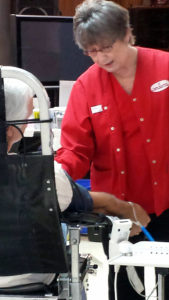
Monday, December 25 ~ NATIONAL. Last week, Canadian Blood Services was calling on eligible blood donors to help fill 35,000 appointments by January 6 to ensure that Canadian patients continue to have access to the blood and blood products they need over the holidays.
The next blood donor clinics coming up in the west shore area are on Monday January 15 at CFB Esquimalt, 1575 Lyall St (9 am to 4 pm); on Monday January 22 at Church of the Advent, 510 Mount View Ave, Colwood (12 noon to 7 pm); and on Monday, February 12 at the Sooke Legion, 6726 Eustace Rd (11:30 am to 6:30 pm).
New and existing donors are welcome and walk-ins are usually accepted. Some of the usually temporary impacts of giving blood include bruising, continued bleeding, dizziness, light-headedness and nausea. After giving blood, donors are offered juice and a cookie and are monitored for a while on site before they leave.
“The holiday period always presents challenges for us as we work to ensure we have enough blood and blood products to meet patients’ needs,” says Rick Prinzen, Canadian Blood Services’ Chief Supply Chain Officer. “We know that Canadians are busy with travel and activities over the holidays, and we hope that they will make time to save a life and give blood. Canadian patients’ lives depend on them.”
Platelets pose a particularly difficult challenge. Patients with serious bleeding or those undergoing cancer treatments rely on platelet donations, but with a shelf life of only seven days, the need for platelets is pressing and ongoing.
Canadian Blood Services manages the national supply of blood, blood products and stem cells, and related services for all the provinces and territories (excluding Quebec). Their integrated, pan-Canadian service delivery model includes leading an interprovincial system for organ donation and transplantation.
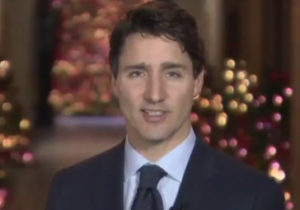
Sunday, December 24 ~ OTTAWA. Prime Minister Justin Trudeau today issued the following statement on Christmas: “Merry Christmas, Canada!
“In 2017, people across Canada gave us much reason to be proud, and showed us the strength in our diversity. Canadians are neighbours helping neighbours, sharing warmth, compassion, and generosity—not just at Christmas, but all year round.
“For Christians around the world, this season is a time to celebrate Jesus Christ and his message of compassion. For all of us, it is a chance to come together to give thanks for everything that unites us.
“As the 150th anniversary of Confederation draws to a close, all of us have a role to play in shaping our world for the better. In the New Year, and throughout the years to come, let’s commit to making a difference. Whether by lending a hand to a neighbour, or volunteering for a cause we believe in, let’s give generously, and live out the values that bring us together.
“Let’s also reach out and listen—to those next door, across the aisle, and at the dinner table. Building a better world starts where we work and live, in our communities, and at home.
“During the holidays, I also ask you take a moment to remember our brave servicewomen and men, and their families. They make extraordinary sacrifices to keep us safe.
“From our family to yours, Hadrien, Ella-Grace, Xavier, Sophie, and I wish you joy, health, love, and peace this holiday season. Merry Christmas.”

“Dec. 25 is a special day for Christians around the world. It is a day set aside to recognize the birth of their Saviour, Jesus Christ, and to give thanks to God for the gift of salvation.
“For people of many backgrounds, Christmas is an opportunity for families to gather together and celebrate warmth, good food and good company.
“It offers us a break from the worries of the everyday world and a chance to focus on things that really matter – the people we love and the communities we care about.
“It is also a time to reach out to people in need, and work in a spirit of generosity to help and support each other.
“We hope that British Columbians throughout the province have a safe and joyful Christmas season.
“On behalf of the Government of British Columbia, Merry Christmas.”
To see Premier John Horgan’s interview in West Shore Voice News, click here: December 15, 2017 issue
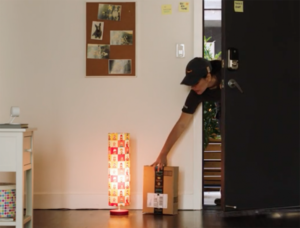
Friday, December 22 ~ EDITORIAL ~ by Mary P Brooke: “How far will you go? Reality check in the digital age”
Apparently you can order something online from Amazon and have it shipped to your door, and right inside your house if you want. If you want?
It made national news this week that someone hacked the delivery-into-your-home system. Really, you’re kidding — people didn’t think that digital thugs weren’t licking their chops to get their hands on this one? Once a delivery was digitally confirmed, stuff would be promptly stolen off the parcel recipient’s front step or even from inside their home by blocking the cameras.
Shakin’ my head here. How far will people trust the new technology? There is virtually no privacy left for anyone anymore. Much of the younger generation doesn’t even really understand what privacy means, they’ve never known it: cameras in most public places for safety and security, multi-layered digital ID cards, and voluntary release of scads of personal details onto Facebook and other social media. So it’s easy to see how parcels inside the door ‘to alleviate your worry about theft’ could naturally arrive in the ‘ok zone’.
At Christmas we reach for the stars in our minds and for the beauty in our hearts. And so it should be. But it’s always been common sense, planning for the inevitable, and tough critical thinking that has saved people in the end.
By all means dream big, you must. Make real the visions of your mind and desires of your soul. It’s what we’re here for. But while expanding your horizons, remember the basics of human nature, including the dark side. And don’t be surprised if you get fooled because you sought convenience or a short cut.
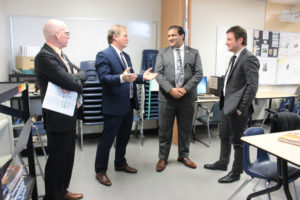
The Sooke School District (SD62) which serves the communities of Langford, Colwood, Sooke, Highlands, Metchosin and Juan de Fuca will receive $23.3 million toward the purchase of 6.5 hectares (16 acres) of land from within the Westhills development.
The site for a middle school and elementary school at the corner of West Shore Parkway and Constellation Avenue will tie together a string of educational and recreational facilities in the area, said Langford Mayor Stew Young, including Belmont Secondary School (where the announcement was made) and nearby public library, arena, bowling alley and sports stadium. Ball fields will be developed as part of the overall project, says Young. He points out the cooperative use of the recreational facilities by students during the day and by the community in non-school hours.
In this his last year of his education career, SD62 Superintendent Jim Cambridge was pleased to host the announcement today, in the commons area at Belmont — the largest school in SD62. He noted that Education Minister Rob Fleming is the former education critic “who knows every rock in the education system”, as a benefit in particular to the fastest-growing area.
A main impetus for gearing up for new schools is to reduce the number of portables currently in use in the overloaded west shore area of SD62. There are presently 13 portables at Dunsmuir Middle School in Colwood and seven at Spencer Middle School in Langford. “We hope to eliminate those in a few short years,” said Cambridge in his remarks at the podium.
Since the availability of new education funding this year, about 3,700 teachers have been hired to help support about 5,000 more students in the community. “We’ve been poaching teachers to come teach in BC,” said Cambridge at the podium. He spoke highly of the SD62 board as being “unique in BC for putting children and learning spaces first”.
Langford Mayor Stew Young called the schools announcement “an early Christmas present”. The mayor who is proactive for community growth and development says “everybody is now taking notice of Langford”. He says that people are excited to be in Langford “because we’re actually providing what is needed by our community”.
SD62 Chair Ravi Parmar addressed the room of about 80 people, thanking the BC Government for “supporting our vision and capital plan” with funding for purchase of the 16 acres in Westhills. Parmar — himself a graduate of Belmont Secondary — said “when this government gets money they spend it”.
Building a new middle school will be SD62’s first priority on the site,followed by an elementary school to address the shortage of K to 5 spaces brought about by an influx of young families to the west shore. About 1,800 more students are expected to arrive in the SD62 catchment area in the next five years.
Present for the announcement by Minister Fleming in the bright spacious Belmont commons room were SD62 trustees and staff; City of Langford Mayor, Council and senior staff; Westhills owners, executive and staff; Education Ministry staff; Belmont principal Ray Miller; STA president Ian Johnson; CUPE reps; parent association reps; members of the business community; and students in study mode upon whom this little event came as a surprise!
 Tuesday, December 12 ~ BC. WorkSafeBC has released six new ladder safety videos to remind workers, employers and homeowners to use ladders safely, both on the job and while decorating at home for the holidays.
Tuesday, December 12 ~ BC. WorkSafeBC has released six new ladder safety videos to remind workers, employers and homeowners to use ladders safely, both on the job and while decorating at home for the holidays.
WorkSafeBC has released six new ladder safety videos to remind workers, employers and homeowners to use ladders safely, both on the job and while decorating at home for the holidays.
“Last year, more than 1,000 workers were seriously injured in falls from height, including while using step ladders, extension ladders and scaffolding,” says Dan Strand, Director of Prevention Field Services, WorkSafeBC.
The new videos and resources illustrate how the right ladder, the correct positioning and hazard assessments could prevent a serious injury or death. www.worksafebc.com
From 2012 to 2016, six workers died and there were 4,920 accepted time-loss claims — including 1,634 serious injuries — as a result of falls from ladders across all industries in BC.
Ladder safety tips: • Select the right ladder for the job. It should be long enough to extend 1m above the upper landing. • Place the ladder on a firm, level surface and inspect it before each use to ensure it’s in good working condition; look for cracks or loose rungs. • Always maintain three points of contact while climbing a ladder: two feet and one hand or two hands and one foot. • Don’t carry heavy or bulky objects while climbing up or down a ladder. • Don’t work from the top two rungs of the ladder or have more than one worker on a ladder at once. • Wind, rain, and snow may pose additional hazards that need to be mitigated. • Check for power lines and ensure a minimum distance of three metres can be maintained at all times before starting work.
WorkSafeBC serves about 2.3 million workers and 231,000 employers throughout BC. In administering the Workers’ Compensation Act, the organization is accountable to the public through the BC government.
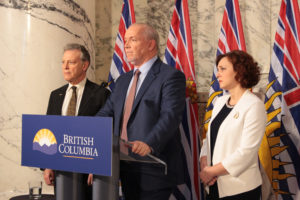
Site C will provide 1,100 megawatts (MW) of capacity, and produce about 5,100 gigawatt hours (GWh) of electricity each year – enough energy to power the equivalent of about 450,000 homes per year in BC.
In making the announcement, Premier John Horgan stated that while Site C should never have been started, the project has been pushed past the point of no return over the past few years. To cancel would have meant asking British Columbians to take on almost $4 billion in debt with nothing in return for the people of the province and, even worse, with a high risk of cuts to services and projects families count on. Horgan reiterated his campaign promise to work hard to help keep life affordable for British Columbians.
However, the electricity load (demand) forecast used to underlie the decision to continue with Site C includes a realistic and responsible recognition of greater electrification in BC homes and industries in the future, especially as carbon emission reduction is a socioeconomic and political goal. The forecast by Deloitte as commissioned by the former government was said to have not incorporated any enhanced electrification of the economy.
Much of the increased future demand is likely to be required by the time Site C is completed and its power comes onstream in 2024. However, today the government said there will be surplus at first, and it will be sold to create revenues. The remaining shortfall between costs and revenues will be made up by electricity consumers (aka ratepayers).
The government has announced a Site C turnaround plan to contain costs, provide enhanced project oversight, and expand benefits to people and communities. Government says it will be putting in place enhanced oversight to ensure final costs are at or below $10.7 billion.
If the Site C project had been cancelled, losses would have meant insufficient funds for the things the BC NDP promised to BC voters in the 2017 campaign including more schools, hospitals and highways as well as expanded child care support. Cancellation would have produced an immediate rate hike of 12% on BC consumers all at once in 2020 without any benefit other than servicing debts and cancellation obligations.
In his public announcement today in the Library Rotunda at the BC Parliament Buildings in Victoria, Premier Horgan delivered “with a heavy heart” his decision to proceed with the Site C hydroelectric project. He was flanked by Minister of Environment and Climate Change Strategy George Heyman and Minister of Energy, Mines and Petroleum Resources Michelle Mungall.
In a way, he had no choice but to give the green light to Site C. It was the goal and intention of the previous BC Liberal government to get the project past the point of no return (notably for contracts with workers, businesses and some First Nations), and they succeeded. The only reason to have started the project in the first place is to keep up with electricity demand into the future, but for years even that premise has been debated.
Not only does the continuation of the project present a long-term financial commitment including continual electricity rate increases for everyone in BC, it presents a quagmire of political challenges for the BC NDP government. Many groups who fought hard against Site C — including environmental, food sustainability and indigenous — feel they are on the losing end of this decision. And the BC Greens (with three MLAs who hold the balance of power in the current NDP-led minority government) are saying they feel betrayed. All of this sets up a myriad of immediate tensions and possibly some political brick walls in the future (including that the NDP caucus was divided on the issue, and that Energy Minister Michelle Mungall could face tensions in her constituency at the next provincial election).
A media briefing ahead of Horgan’s announcement began with this: “After review by BCUC, meeting with Treaty 8 First Nations, advice from independent experts and lengthy deliberation, Cabinet has made the difficult decision to complete Site C construction.”
Right out of the gate the presentation showed that hydro rates have been “rising significantly” since 2003. In 2014, a 5-year package of rate hikes would have seen rates were go up 28.5%; four of the past five years saw hefty increases loaded on the backs of consumers – notably 9% in the first year (followed by 6%, 4% and 3.5% this year); for 2018 the BC NDP government has issued a reprieve on the previously approved 3% increase.
With Site C going ahead, increases for electricity usage will occur year after year – up about 30% over 10 years (2019 to 2028). The government says hydro rates in BC are still relatively low compared to other provinces and cities in Canada and North America. Highly industrialized areas like Ontario and California have among the highest rates. Quebec has the lowest.
So-called ‘new power’ (from Site C) will cost $60/MWh to produce, compared to $32/MWh from the present generation system. The elephant in the room is the cost of energy production having been privatized under the Gordon Campbell BC Liberals back in the early 2000s — private companies that produce power and feed it into the grid are costing BC Hydro $100/MWh. And the share of supply by Independent Power Producers (IPP) is growing, which continues to push up the cost of electricity for British Columbians.
Studies apparently show that where the sources of power are varied in a jurisdiction – including hydro, fossil fuel, solar and wind, and nuclear, that the cost of power to produce power is somewhat less strident where hydro takes the lead.
The Site C decision was a complex equation, which Horgan said today was the most difficult in his 30 years in public service and politics. He knows all too well who he needs to please, and who he has disappointed. Included in the decision by Horgan and his cabinet was that shareholders who have invested in the expansion of electricity in BC will expect a good return on investment. If shareholders are spooked, BC’s bond rating could go down and that would affect many other aspects of the provincial budget.
Horgan said in his announcement today that BC Hydro had been “raided” by the previous government in order to produce a balanced BC budget. Part of cleaning up the mismanagement of BC Hydro was to appoint a new Chair. In one of his first actions as the new Premier, in mid-July Kenneth Peterson was appointed to replace Brad Bennett who was one of BC Liberal Leader Christy Clark’s election campaign advisers and president of real estate investment firm McIntosh Properties) and a few more directors considered more qualified will still be appointed, it was stated today by government.
To “lessen the burden” on BC Hydro and on British Columbians, Horgan announced some mitigating actions such as creating a food security fund to ensure we’re increase the productivity of agricultural land, and making it more viable to farm in the Peace and across BC. Reopening standing offer so indigenous people can build clean renewable energy and sell it back into the grid. More training opportunities for local businesses and workers (much better than the 49 apprentices we have in place today). And a new oversight committee to make sure that the current budget is met in the next number of years.
Horgan said he and his colleagues made the Site C decision upon finding themselves in a situation where they had to accept realities, “not as we wish it to be”. Horgan said: “It’s not the project we would have favoured, and not the project we would have started. But we’re three years in. It must be completed to meet the objectives our government has set.” He said the costs can be recovered “over a long period of time by the sale of electricity” which of course includes rate increases for consumers.
To those who Horgan expects will be disappointed by the government’s decision today on Site C, he said today: “I respect the strength of your convictions. I share your determination to protect BC farmland. Decisions must be done in tandem with indigenous peoples but those decisions have passed (as negotiated by the previous government).”
Knowing he was disappointing ‘family and friends, Horgan said that “proceeding is the best way forward” but the decision was not an easy one: “We do it with a heavy heart. But we have to focus on the future and on delivering for people.” ~ WSV
TECHNICAL and TIMELINE BACKGROUND: The Site C Clean Energy Project (Site C) will be a third dam and hydroelectric generating station on the Peace River in northeast BC. Site C will provide 1,100 megawatts (MW) of capacity, and produce about 5,100 gigawatt hours (GWh) of electricity each year – enough energy to power the equivalent of about 450,000 homes per year in BC. The Site C project received environmental approvals from the federal and provincial governments in October 2014, then got the green light from the Government of BC in December 2014. Construction of the project started in summer 2015 and will be completed in 2024. After a review of Site C by the British Columbia Utilities Commission in the fall of 2017, the B.C. Government chose to continue construction on the project. Site C will be a source of clean, reliable and affordable electricity for more than 100 years.
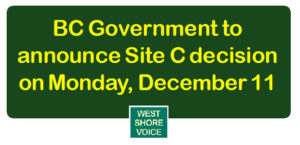 Sunday, December 10 ~ VICTORIA (posted at 6pm). Premier John Horgan is ready to announce his decision about whether or not to proceed with construction of the Site C hydroelectric project. He will make the announcement in Victoria tomorrow, Monday December 11.
Sunday, December 10 ~ VICTORIA (posted at 6pm). Premier John Horgan is ready to announce his decision about whether or not to proceed with construction of the Site C hydroelectric project. He will make the announcement in Victoria tomorrow, Monday December 11.
Update later Sunday evening (posted at 11:30 pm): For some reason, longtime political journalist Keith Baldrey thought it necessary to upstage the Premier and tonight leak out that Site C will go ahead. Professional journalists need to do better than that. So the project is going ahead. But without details in the ‘scoop’ (as to why the go-ahead decision was made), there is really no benefit to the public to give a half-day’s advance notice. Ethics in journalism still matter.
A month ago, when pressed about his decision whether to proceed with or stop the Site C hydroelectric project, Premier Horgan replied that it is a $12 billion dollar project and that if it proceeds it will affect contracts, indigenous interests in the area, and individuals.
If the project is cancelled, the cost would be about $4 billion (over $2 billion already spent or committed, plus another $1.8 billion to remediate the site).
“Site C is over budget and off schedule,” said Premier Horgan, adding it’s something he’s been saying “for some time”. He reiterated having run on a platform of affordability for British Columbians. He said it was “bad policy making from the start” for former Premier Clark to try to “get the project past the point of no return”.
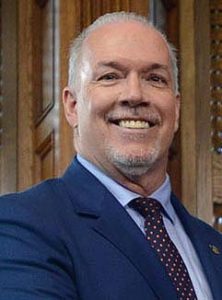
Having information made public about Site C decision-making is something Horgan promised during the 2017 election campaign, and he seemed pleased that the BC Utilities Commission (BCUC) report was made available to the public last month.
At present, Horgan says there is an oversupply of electricity in the North American market. He says the estimates by BC Hydro for future electricity demand are wrong. However, the jury may be out on that, given the increase in use of electric cars and charging massive batteries (in size and/or number) for other uses in the modern digital age. While alternative energy sources are moving forward in various ways, there is no way of telling whether natural gas, biomass heat capture, wind power and other methods will be far enough along should a growing population require more electricity in five to 10 years time.
“It’s not an easy choice or decision. I will be grappling with it for the next couple of weeks,” Horgan said on November 8. And now the time for announcement of his decision has arrived (Monday December 11).
Read the West Shore Voice News editorial about the impact of the new BC NDP government on the lives of British Columbians, page 2 in the December 8, 2017 issue of West Shore Voice News.

Taking place at the Doug Mitchell Thunderbird Sports Centre at the University of British Columbia January 8 – 14, 2018, the week will also be high-profile exposure for Vancouver and Canada’s west coast and a winter tourism draw for people from all over BC (tickets $19.99/day Jan 8-11 up to $40-75 for final days; $10 at the gate to watch junior and senior practices).
The event is an Olympic-qualifier for Canada’s team at the 2018 Olympic Winter Games in South Korea. The championships will feature about 250 skaters, competing in the men, women, and pair ice dance disciplines. About 8,000 spectators are expected to attend, with thousands more throughout Canada watching via CTV’s live broadcast.
The anticipated economic activity generated by the competition is approximately $6 million, said a Ministry of Tourism, Arts and Culture news release on December 8.
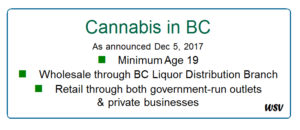 Tuesday, December 5 ~ BC. Today December 5, the Province of BC has released a number of key decisions on cannabis regulation in BC.
Tuesday, December 5 ~ BC. Today December 5, the Province of BC has released a number of key decisions on cannabis regulation in BC.
The following policy decisions were shaped by feedback provided by individuals and municipalities who participated in the engagement (48,951 British Columbians, and 141 local and Indigenous governments):
- Minimum age – British Columbia will set the minimum age to possess, purchase and consume cannabis at 19 years old. A minimum age of 19 is consistent with BC’s minimum age for alcohol and tobacco and with the age of majority in BC.
- Wholesale distribution of cannabis – Like other provinces, BC will have a government-run wholesale distribution model. The BC Liquor Distribution Branch (LDB) will be the wholesale distributor of non-medical cannabis in BC.
- Retail of cannabis – The Province anticipates establishing a retail model that includes both public and private retail opportunities and will share details regarding the model in early 2018.
Legalization of non-medical cannabis in Canada is anticipated to start July 1, 2018 following the passage of federal legislation in the new year.
“Looking at the responses received, it’s clear that British Columbians support the priorities of protecting young people, health and safety, keeping the criminal element out of cannabis and keeping roads safe, which will guide the Province in developing BC’s regulatory framework for non-medical cannabis,” said Minister of Public Safety and Solicitor General Mike Farnworth.
From September 25 to November 1 of this year, the public and stakeholders were asked to share their input and expertise on a range of issues related to the regulation of non-medical cannabis in BC, including minimum age, personal possession, public consumption, drug-impaired driving, personal cultivation, wholesale distribution and retail models. Most of the public input was received online.
The policy decisions announced today also reflect the feedback received from the local government members of the Joint Provincial-Local Government Committee on Cannabis Regulation (JCCR) and are endorsed by the Union of BC Municipalities executive.
“We thank all British Columbians who provided their input during the important public and stakeholder engagement process,” said Farnworth.
“We will continue to consider your opinions as we further develop policy and legislation that is in the best interests of this province, ensuring a made-in-BC approach to the legalization of non-medical cannabis that will keep our roads and communities safe, protect young people, and promote public health and safety.”
The provincial government says it “still has a number of key decisions to make as it prepares for the legalization of cannabis”. These decisions “will be informed by the feedback collected through the public and stakeholder engagement” but there will be further consultation with local and Indigenous governments and other key stakeholders.
Link: Cannabis Regulation in B.C.: What We Heard report on public and stakeholder engagement: http://engage.gov.bc.ca/BCcannabisregulation/
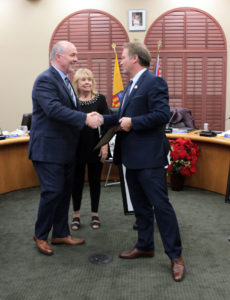
Saying he moved to Langford 25 years ago, Horgan says Langford has been “transformative” for him: “I raised my family here, became a member of legislature here, and became the premier here.”
As part of recognizing 25 years of municipal service by Mayor Stew Young and Councillors Denise Blackwell and Winnie Sifert, the premier called Langford’s success “an extraordinary accomplishment”.
“it’s absolutely unparalleled to have that much dedication and commitment to your community,” said Horgan about Langford’s mayor and council. He said that Langford has demonstrated “the things that you can do when you work together and have a vision, and have a community this inclusive.”
Horgan noted Langford’s amenities for young families such as good schools, good sports, great arenas, the YMCA, and libraries. “It just keeps getting better, month after month, year after year. It’s been an extraordinary 25 years in Langford, I have a great deal of gratitude for you,” said Horgan to Mayor Young, Langford council, and city staff.
“People are coming and bringing families here, starting businesses here, and creating opportunities for themselves. It is all because of the work that you do in this room,” Horgan said.
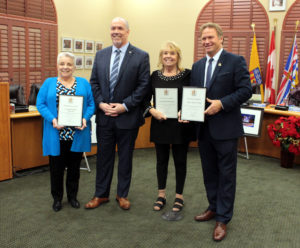
“It’s one of the things our council prides itself on. Helping everybody who’s in business,” said Young, noting how using the services of local businesses is key. “The business community comes to our community.”
Noting his 25 years as Mayor, Stew Young said he is happy and proud to have a team behind him that works so hard to improve the community where he was born and grew up.
Guests this evening included local developers, to whom Horgan gave a nod: in a recent speech to the Urban Development Institute in Vancouver Horgan had highlighted how well things get done to speed along with building permits and the growth of the community.
Friday, December 1 ~ VICTORIA. November 2017 saw the highest number of property sales of any November in the Greater Victoria area since 1996 — 671 in total (12% more than sold last November). The number of active listings for sale dropped 7.4% in one month from October to November.
The Victoria Real Estate Board (VREB) predicted last month that buyers might accelerate their purchase timeline to buy a home ahead of ‘stress test’ rules set for January 2018. Overall in Greater Victoria there were 307 single family home sales in November selling at a raw average price of $902,985.
It should be understood that VREB’s data-adjusted HPI figures show $693,200, which means people are paying far above what most people hear as the selling price.
In the west shore, the real price of a house in Langford last month was $696,933 (61 sales) while the HPI was given as $593,800. In Colwood there were 15 sales averaging out at $725,290 while the HPI was $658,100. In Sooke there were 18 house sales in November at a real average sale price of $509,418 while the HPI was $483,300.
So that’s almost a million dollars in overall Greater Victoria for a house and over half a million in Sooke where housing is considered to be affordable.
Condo sales rolled in like this: 219 in Greater Victoria averaging $437,822; Langford 26 sales averaging $330,298; Colwood 5 sales averaging $396,900; and one sale in Sooke at $229,000. All stats: www.vreb.org

Thursday, November 30 ~ BC. Premier John Horgan told media today that he considers the Fall Session of the legislature to have been a success. He itemized that his minority government has passed a number of key bills and that they worked on a number of initiatives that were laid out in the election platform.
He jumped right into how a 4-year mandate to achieve “all of the results” will be helpful to “working for people and delivering the services that they depend on”.
 “Elimination of big money will be transformational,” he said, not just at the provincial level but municipal as well.
“Elimination of big money will be transformational,” he said, not just at the provincial level but municipal as well.
Premier Horgan is keen about the public engagement about the upcoming electoral reform referendum as available online at https://engage.gov.bc.ca/howwevote/ . The wording of the referendum question will be announced in the new year after input from public engagement has been reviewed, said Horgan.
About the referendum question that ends up on the ballot: “I want it to be as clear as possible, and I want the public to make this choice.” Horgan said that Green Party Leader Andrew Weaver said ‘just do it’. “But I think that’s not the right way to proceed in the 21st century. We want to engage with people and ask them how they want us to proceed. I want it (a winning referendum result) to be 50+1 and that the public makes the choice,” Premier Horgan said today.
With a bit of retrospection, Horgan said that the period between the May 2017 election campaign and the swearing-in that was held mid-July will be seen as a “most heightened period in political history, with people “suddenly interested in what happened here … the role of the speaker and the role of the Lieutenant Governor in our democracy.”
He called the first minority government in 50 years in BC a “unique opportunity… where parties are working together to make life better for citizens in this great province”.

Thursday, November 30 ~ BC. Today in a media session from the BC Legislature, Premier John Horgan defended his position on opposing increased tanker traffic through BC waters, and vowed to maintain that position for the sake of BC’s economy and environment. “I have a great deal of respect for Premier Rachel Notley and the progressive work she’s doing as leader of that province, but my response is to stand firm for the interests of our province,” Horgan said about Alberta’s premier who today continued her pitch to expand pipelines that would bring more crude oil to the coast.
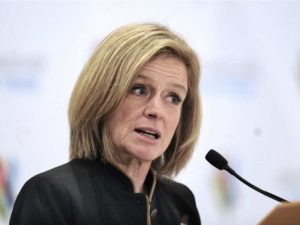
Earlier this week, Alberta Premier Rachel Notley had called on the federal government to step up its efforts to support the project. Today November 30, Notley said while speaking in Vancouver to BC business leaders about the future of energy in Canada and local pipeline projects, that she was pleased with the federal government support the National Energy Board process to resolve permit delays.
“I hope (the federal government) will continue to embrace their role as a key player in promoting what is, in my view, a national project,” Notley said. She noted that several years ago, 44,000 British Columbians earned $2 billion in income by working in Alberta. But today BC Premier Horgan said his government’s opposition to pipeline expansion remains in the interest of economic and environmental benefits to BC.
Thursday, November 30 ~ BC. HORGAN ON HOUSING. “Housing is the number one issue on my desk right now,” said Premier John Horgan today, though last week his top concern was the decision he is soon to make about whether the Site C hydroelectric project continues or gets cancelled. For housing , the Premier said that his government will have “a comprehensive plan in February”.
He itemized the need for more 2-bedroom and 3-bedroom units “to allow families to grow and maintain a connection to community”. On the demand side, he indicated that his government will aim to “remove speculation in the market”.

Wednesday, November 22 ~ VICTORIA. BC Green Party leader Andrew Weaver today read to the BC Legislature a warning from a letter signed by from 15,364 scientists in 184 countries.
The letter, published last week by the Alliance of World Scientists entitled World Scientists’ Warning to Humanity: a second notice warns world leaders that there needs to be change in order to save the earth.
The full letter is posted here http://scientistswarning.forestry.oregonstate.edu/ and scientists from any scientific discipline (e.g. ecology, medicine, economics, etc.), are invited to endorse the letter.
“As leaders, we have a responsibility to younger generations to ensure that our actions today do not leave them worse off than we are,” said Weaver.
Weaver said he was proud to deliver the scientists’ message to the BC legislature “so that we may be reminded of this responsibility and take urgent action to address climate change”. Weaver continued: “BC has a history of leadership in climate action. I am proud that our Agreement with the BC NDP has once again moved us in this direction, but there remains much work to be done.”
“BC has a highly educated workforce, abundant natural resources and is one of the most beautiful places in the world to live. If we have the courage to champion a bold vision, we can ensure that BC is a leader not only in climate action, but also in the low-carbon economy that is emerging as world leaders step up to reduce emissions.”
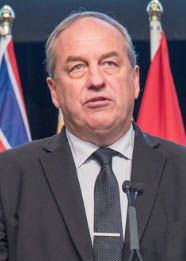
The warning comes 25 years after Dr. Henry Kendall, a Nobel Laureate and former Chairperson of the Union of Concerned Scientists, organized a similar statement signed by 1,500 scientists in 1992.
Weaver is a renowned climate scientist who prior to his election to the BC Legislature in 2013 served as Canada Research Chair in climate modelling and analysis in the School of Earth and Ocean Sciences at the University of Victoria.
Weaver was a Lead Author on the 2nd, 3rd, 4th and 5th Intergovernmental Panel on Climate Change’s scientific assessments and has authored or coauthored over 200 peer-reviewed, scientific papers and was the Chief Editor of the Journal of Climate from 2005-2009.
Tuesday, November 21 ~ VICTORIA. BC Premier John Horgan and Washington Gov Jay Inslee have issued the following statement after their first official meeting and the governor’s address to the Legislative Assembly of British Columbia:
“Today, we reaffirmed our commitment to work closely together and strengthen the enduring and unique partnership between British Columbia and Washington state.
“We recognize our shared responsibility to protect the environment, grow our economies, find new opportunities to expand our flourishing tech and innovation corridor, and create good jobs on both sides of the border.
“Our governments remain committed to joint action and leadership in the fight against climate change, and in the pursuit of strong, sustainable economic development that works for the people of Washington and British Columbia.”
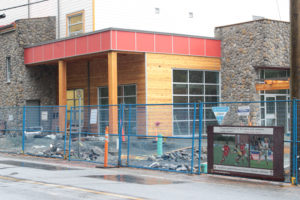
As announced yesterday by Rugby Canada, a restructuring within the burgeoning National Sport Federation will be implemented “to drive operational excellence”.
The restructuring announced today allows the organization to align and focus its resources with its evolving high performance objectives and expanded National Team operations in Langford, along with the opening of the Al Charron Rugby Canada National Training Centre at 3019 Glen Lake Road in early 2018. The cost of the joint project of the Government of Canada, City of Langford, and Rugby Canada is $7.84 million.
As part of the restructuring, several departments will relocate to Langford over the next three to six months from the organization’s corporate office in Richmond Hill, Ontario. Rugby Canada’s Finance, Marketing and Communications, General Operations and Governance departments will relocate to the Federation’s existing Centre of Excellence facility at 3024 Glen Lake Road.
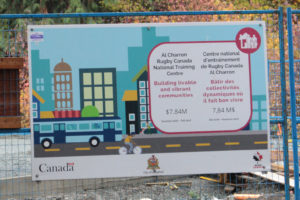
“This is a good organizational change from the top down,” says Langford Mayor Stew Young. “It is good for rugby’s advancement on the world stage and good for the athletes. Most of the teams Canada competes against have made changes and are showing results,” he said this week. “Centrally focusing on the front office is good for rugby in Langford. We are are strong partner and supporter of Rugby Canada and look forward to a long committed relationship with rugby players and staff.”
Mayor Young is looking forward to the grand opening of the Al Charon Centre for excellence which he says “will be a huge benefit for the Canadian men’s and women’s teams and give them the extra advantage while playing for Canada on the world stage.”
The Rugby Department within Rugby Canada has been led by Jim Dixon for the past two and a half years. “On behalf of the Canadian Rugby community and everyone at Rugby Canada, I would like to thank Jim for his commitment to the organization, our National Teams and Development programs. We wish Jim every success in the future,” said Allen Vansen, CEO, Rugby Canada.
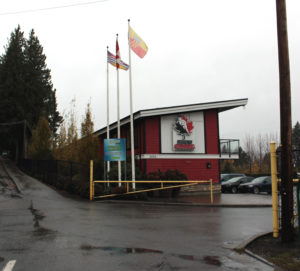
An external party with relevant expertise in the Canadian sport system was called in to help assess and guide the restructuring toward “increased synergies in the daily operations of the staff and permit a downsizing of Rugby Canada’s office requirements in Richmond Hill for efficiencies”. Rugby Canada’s Board of Directors says it fully supports and endorses this new organizational change. It is absolutely necessary,” said Tim Powers, Chair of the Rugby Canada Board of Directors. “We would also like to thank Jim, Myles, Linh, Carlos, Nina, Audrey and Cindy for their unwavering commitment to our sport.”
“This marks the beginning of a new era for Rugby Canada, as one of Canada’s fastest growing sports,” added Vansen. “While always difficult to reach these tough decisions, this is the best path forward to reach our organization’s performance and growth objectives. These changes will help Rugby Canada build a world class organizational culture and enhance the performance of our Sport development and National Team programs, today and into the future.”
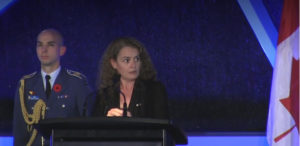
Sunday, November 12 ~ NATIONAL. Working hard toward the open-minded view. INSIGHT-EDITORIAL by Mary P Brooke, West Shore Voice News
Canada is fast gaining an international reputation for advancing by leaps and bounds in various social areas, like flinging open the doors to immigration, working fast toward legalization of cannabis by next summer, and labouring toward reconciliation with indigenous peoples in various areas of concern. Zero tolerance for sexual harassment and bullying have become, finally, pretty much mainstream. Remembrance Day this weekend should remind all of us how much sacrifice has been made over the last century to uphold all manner of freedom and personal dignity in our country.
So in the context of this fast-action swirl of progressive social movement in this country, it was odd — and made national headlines — that Canada’s new Governor General took a swipe at ‘believers’. Religious or not, most people realize this is a country based on a founding faith and where all faiths are respected, or at least the freedom to hold beliefs that might be different from yours or mine.
In a speech at the 9th annual Canadian Science Policy Convention in Ottawa on November 1, Governor General Julie Payette mocked with a wide brush the entire art and science of astrological interpretation and calculation. While astrology is not exactly a belief-system, it has been shown to be an effective tool for self-awareness and understanding. The math to calculate planetary transits isn’t easy … before the advent of modern computing the charting was done by hand. Some world-class astrologers such as the industrious Neil F. Michelsen (organizer of the modern ephemeris) and the uniquely brilliant Jim Lewis (inventor of astrocartography) in the late 1970s and early 1980s generated entire volumes of analysis based on math done with calculators and good ol’ brain cells.
There was a time, long long ago, when the stirrings of modern science and medicine were mocked. Germs we can’t see? Nonsense! Today’s accurate science is essential and should rightly guide the development of technological civilized nations. But we should remember that over time many scientific ‘truths’ have been debunked, followed by further advancement. Meanwhile, the evidence of one’s life purpose can be examined through competent natal astrological analysis based on one’s geographical entry point into time and space on earth (i.e. birth), pointing to congruence for the individual within their social framework.
Years ago it was actually a mainstream university administrator in my world (not a hippie with sun signs and moons pasted up around the room) who pointed out the value of a system of personal insights that accepts a myriad ways of being ‘right’ and whole. Today’s mental health movement that is based dangerously on models that lead to labeling and medication could well take a page from that book to recognize that not all pegs fit into the same holes. [Footnote: there is value in utilizing therapeutic levels of nutritional supplementation as an approach to managing mental health, rather than by rote reverting to drugs and psychotherapy. ‘We are what we eat’, entirely scientifically proven – cellular microbiology at work. Canadian founder of that research and clinical application: Dr Abram Hoffer.]
Youth are stressed by frantically working hard to ‘fit’ and find a place in the big scheme of things (that’s always been the challenge of approaching adulthood but it’s incredibly more complex in a digital, global, hyper-social era). It takes a constellation of personalities to create the universe of humanity, and while our culture gives lip-service to diversity, it’s still tough for those who don’t find a ready niche.
It’s a fool’s path to wake up in the morning and guide one’s every move of the day based on sun-sign astrology. But utilizing deeper astrological principles as a tool for the continual work of personal self-actualization (e.g. providing direction for choices in lifestyle and career), family dynamics (noting the insightful work of international depth astrologer and author Erin Sullivan), and sociocultural examination (e.g. all baby boomers were born with transformational Pluto in fiery self-focused Leo) is a principled choice that flies neither in the face of science nor religion. Understanding of self and society, by whatever tool or system, is clarity worth achieving.
With her one fell-swoop mocking astrology, Payette gave Canadians a glimpse of an old-school intellectual arrogance that does not fit within Canada’s newfound bent for exploring with an open mind all things ‘wonderful and new’.
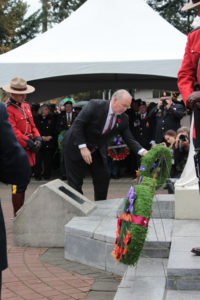
VIPs arrived in a parade. At Veteran Memorial Park, about 1,000 people were gathered under threat of rain, standing or seated in some bleachers in the cold for the one-hour event.
Service personnel in uniform stood in formation for the entire hour. Music by the Westshore Community Concert Band, Gordon United Church Choir and Westshore Girl Guides.
Roads were closed in central Langford, including by large trucks positioned horizontally across roads. Helicopters and airplanes flew overhead at various points. On-the-ground security was present but not overtly obvious.
Four mayors from the west shore area laid wreaths immediately after Premier Horgan: Langford Mayor Stew Young, Colwood Mayor Carol Hamilton, Metchosin Mayor John Ranns and Highlands Mayor Ken Williams.
To see the Remembrance Day messages from Prime Minister Justin Trudeau, BC Premier John Horgan, and BC Green Party Leader Andrew Weaver, see the November 10, 2017 Remembrance Day issue of West Shore Voice News.
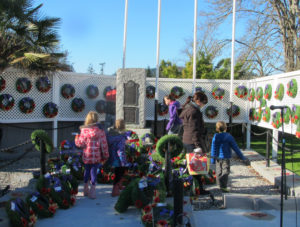
Friday, November 10 ~ BC. Premier John Horgan released the following statement in honour of Remembrance Day tomorrow.
“On Remembrance Day, people around British Columbia honour veterans, armed forces members, merchant marines and families who have sacrificed in service of our country.
“For many of us, it’s impossible to imagine the courage it takes to put on a uniform and go into harm’s way. Yet for generations, Canadians have bravely risked their lives to protect ours.
“Today, in moments of silence all around the province, we pay tribute to loved ones lost, and to those who have returned with injuries, both visible and invisible.
“We cannot forget the tragedies of war, and we must all work together to build a more peaceful world. Lest we forget.”
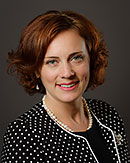
Wednesday, November 8 ~ VICTORIA. A significant announcement about freezing BC Hydro rates was made today by the BC NDP government, fulfilling a key campaign promise about affordability for British Columbians.
It puts “an end to the years of spiraling electricity costs that have made life less affordable for BC homeowners and renters,” Minister of Energy, Mines and Petroleum Resources Michelle Mungall announced today.
BC Hydro rates have gone up by more than 24% in the last four years, and by more than 70% since 2001. This was part of a five-year roll-out that started in 2014 under the former BC Liberal government. The steady march of increases appeared to be tone-deaf from the start as to the overall recession-recovery financial struggles of households and small businesses in BC.
Mungall says that in 2016, BC Hydro applied to the BC Utilities Commission for three years of increases, with a 3% increase planned next year, but will be pulling back its request “consistent with this administration’s commitment to a rate freeze”.
The rate freeze will provide government the time to undertake a comprehensive review of BC Hydro, it was stated in a Ministry of Energy, Mines and Petroleum Resources release. “That review will identify changes and cost savings to keep rates low while ensuring BC Hydro has the resources it needs to continue to provide clean, safe and reliable electricity.”
Details of the scope and process for the review will be developed once government has made a final decision on Site C, which earlier today Premier John Horgan said would take another couple of weeks.
After completing a comprehensive review of BC Hydro, any cost and revenue adjustments identified will be reflected in rates starting in April 2019, the government said. This likely gives consumers just a one-year reprieve.
The rate freeze follows government’s commitment in its September budget update to phase out the provincial sales tax on electricity for small businesses.

Wednesday, November 8 ~ VICTORIA. BC Premier John Horgan in his weekly media session at the BC Legislature reiterated the degree of pressure he is under to decide about Site C.
Making a decision about whether to proceed with or stop the Site C hydroelectric project is a $12 billion dollar decision, affecting contracts, indigenous interests in the area, and individuals, he explained.
If the project is cancelled, the cost would be about $4 billion (over $2 billion already spent or committed, plus another $1.8 billion to remediate the site).
When pressed by media as to what appears to be slow action on calling a by-election in Kelowna West (a seat left empty by the departing Christy Clark) Horgan used the magnitude of this decision, in part, to defend not calling the by-election this fall. His other reason is seasonal timing… too close to the Christmas holiday season, saying people wouldn’t appreciate that.
Having information made public about Site C decision-making is something Horgan promised during the 2017 election campaign, and he seemed pleased that the BC Utilities Commission (BCUC) is now available to the public.
At present, Horgan says there is an oversupply of electricity in the North American market. He says the estimates by BC Hydro for future electricity demand are wrong.
“Site C is over budget and off schedule,” said Premier Horgan, adding it’s something he’s been saying “for some time”. He reiterated having run on a platform of affordability for British Columbians. He said it was “bad policy making from the start” for former Premier Clark to try to “get the project past the point of no return”.
It would be costly to shut down the project, but that must be weighed with the social and economic costs of falling short on electricity demand in the future. While alternative energy sources are moving forward in various ways, there is no way of telling whether natural gas, biomass heat capture, wind power and other methods will be far enough along should a growing population require more electricity in five to 10 years time.
“It’s not an easy choice or decision. I will be grappling with it for the next couple of weeks,” Horgan said today.
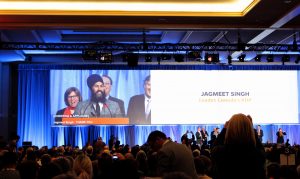
just over one month ago in Toronto. Since then he has gained a unique flavour popularity in the NDP camp and attracts a curious level of fascination across the country.
Bounding onto the stage at the Victoria Convention Centre on November 4, Singh was accompanied on stage for the duration of his 20-minute speech by elected members of parliament and party leaders.
He began with accolades for BC Premier John Horgan and the BC NDP for “changing the course of 16 years and bringing in an NDP government”. He commended the new BC NDP government for their comprehensive strategy to tackle poverty in BC, and for working to re-establish a Human Rights Commission. In followup to a final point about raising the corporate income tax “so that everybody pays their fair share”, Singh said to Horgan and the provincial NDP: “Thank you for showing us the way.”
Singh came right out to say that the national NDP party experienced a “pretty significant setback” in the 2015 federal election, but was upbeat about the NDP MPs holding six of seven seats on Vancouver Island.
As for his fast-track to the 2019 election campaign, he is already challenging the federal Liberals for “not implementing any strategy to fight climate change”. Singh says the NDP are opposed to the infrastructure bank set up by the Liberals, though perhaps not realizing the jobs and community growth that it supports.
Singh got two spontaneous standing ovations during his speech… once for his statement that no Canadian should have “less of a sense of self worth” because of the colour of their skin, and again with his statement of the obvious that “poverty, mental health issues and addiction are social justice problems, not a criminal problem”. As a former criminal defence lawyer, that last statement really had some punch.
It is always evident how the NDP across Canada rally together to support new stars on their team. The only chink in that armor is the differential between Alberta’s NDP Premier Rachel Notley and BC Premier John Horgan over the pipeline issues.
Singh wrapped up his articulate, in-depth yet buoyant speech with “yes we can”.
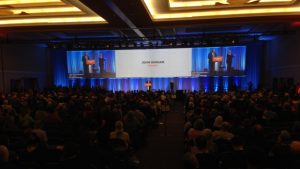
In his speech to delegates this morning, Premier John Horgan said: “Guided by our values, we will do what is right for the people of BC.” Horgan generated large cheers throughout his speech, but the loudest came when he told delegates he will set his sights high and not accept second best.
After a special welcome to delegates from the BC Interior who were impacted by this past summer’s wildfires, Horgan continued: “Helping people and building community — these are BC values, and they are New Democrat values. BC is with you, and together we will help you recover. Helping people is what our government is all about. The BC Liberals left people behind. They gave tax breaks to millionaires while making families pay more. They ripped up contracts. They rolled back rights for workers. They cut vital public services. And they mismanaged BC’s crown jewels, ICBC and BC Hydro.”
Horgan re-promised the increase to a $15/hour minimum wage, and took additional pride in having created a standalone Ministry of Mental Health and Addictions. “Help, hope and opportunity is what a better BC is all about,” the Premier said. “Our government is opening the doors of opportunity for people. We lifted social assistance rates by $100 a month, the first increase in 10 years. We hired thousands of teachers to give students the support they need in our classrooms. We ended the heartless bus pass claw-back for people with disabilities. We eliminated tuition fees for Adult Basic Education and English Language Learning programs, and for former kids in care who want to go to college or university.”
Getting deeper into the political, Horgan said “the BC Liberals say we haven’t acted fast enough. We’ve had 16 weeks, they had 16 years.” We are going to build hospitals, schools, transit, with BC workers to benefit BC communities.
He pledged to continue supporting traditional industries like forestry and mining, and to promote value-added and manufacturing. He says the BC NDP government will “grow the new economy and create good jobs for people as we build our province”. And in wrapping up: “Together, we will build a stronger, fairer, more just province, where no one is left behind.”
Friday, November 3 ~ VICTORIA. Today through Sunday (November 3 to 5) over 1,000 New Democrats are gathering at the Victoria Conference Centre for the BC NDP’s 45th Convention.
Party Leader John Horgan will address fellow party members for the first time since becoming Premier, on Saturday morning. “We’re thrilled to be here in Premier John Horgan’s hometown,” said Raj Sihota, the Provincial Director of the BC NDP. It’s the first convention in 16 years with an NDP government in the Legislature. There will be discussion about how to grow the party to “support the good work of our government and keep building a movement for a better BC,” said Sihota in a news release.
Delegates will debate policy resolutions, participate in training and workshops and hear from guest speakers including Jagmeet Singh, newly elected federal NDP leader.
The BC NDP say they remain committed to the issues British Columbians voted for this spring: “making life more affordable, improving the services we all count on, and building a sustainable economy that works for everyone”.
There will be caucus and committee meetings, the Young New Democrat Convention, the Women’s Rights Committee Convention, and an election for Party leadership.
 Friday, November 3 ~ VANCOUVER. BC is jumping deeper into the Amazon world. Today November 3, BC Premier John Horgan welcomed Amazon’s plans to double the size of its professional workforce in British Columbia.
Friday, November 3 ~ VANCOUVER. BC is jumping deeper into the Amazon world. Today November 3, BC Premier John Horgan welcomed Amazon’s plans to double the size of its professional workforce in British Columbia.
“We’re growing a strong, sustainable economy that benefits everyone, by bringing good-paying jobs to BC and investing in training the workforce of tomorrow,” Premier Horgan said at a media announcement in downtown Vancouver this morning.
“We will build on Amazon’s plans to bring 1,000 new jobs to BC by continuing to open up access to education and skills training.” The Seattle-based company has announced plans to double its BC-based professional workforce to 2,000 by early 2020.
The announcement is unrelated to Amazon’s plans to open a second headquarters.
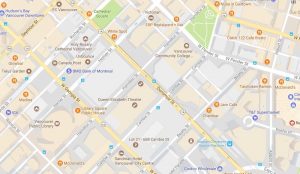
Premier Horgan was joined by Alexandre Gagnon, Amazon’s vice-president for Canada and Mexico, announcing that the company will lease a new 4,500 sq m (50,000 sq ft) building on Dunsmuir Street.
“Tech companies employ more than 100,000 people in BC, with significant opportunities for growth,” said Jobs, Trade and Technology Minister Bruce Ralston. “Amazon’s investment contributes to an industry that creates well-paying jobs that will benefit every corner of our province.”
Jobs in tech pay 75% more than the provincial average. The BC government will help British Columbians develop the skills they need to get these high-paying jobs with more tech-related seats, co-op programs and other post-secondary and skills training opportunities.
“The message we are hearing from leaders in the tech industry is they will hire as many people as we can train,” said Parliamentary Secretary for Technology Rick Glumac. “We’re bringing down barriers for BC workers because the more we invest in people, the more companies will invest in BC.”
The provincial government says it is investing in the future of BC workers by bringing down barriers to post-secondary education and skills training. Since August 2017, government has cut the provincial student loan interest rate in half, removed tuition fees for adult basic education and English as a second language programs, and eliminated post-secondary tuition for children who grew up in government care.
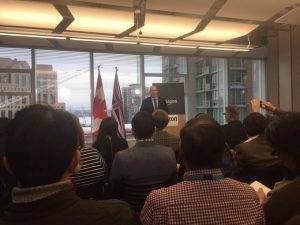
“Amazon’s decision to expand in BC is a testament to the growing recognition of our tech sector on the global stage,” Tam said. “BC continues to be a desirable destination for tech companies to locate and grow, because of our province’s vibrant tech community, our attractive investment climate and exceptional talent base.”
BC saw a 1.9% rise in the number of new technology companies in 2015, growing to over 10,000 businesses. More than $200 million is being invested over the next two years in tech and science post-secondary capital projects in British Columbia. The GDP of BC’s tech sector expanded 2.4% in 2015, contributing $14.1 billion to BC’s overall economic output.
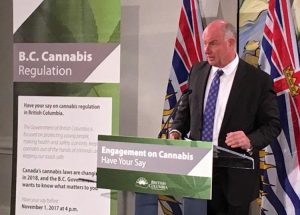
Thursday, November 2 ~ BC. After a final push to invite public input, the number of people filling out the BC Cannabis Regulation Engagement survey online saw about 18,000 engagements in the last of five weeks.
As of October 25 about 30,000 British Columbians had participated, and by the November 1 closing, 48,151 individuals had provided feedback on on topics about non-medicinal cannabis such as minimum age, personal possession limits, public consumption, drug-impaired driving, personal cultivation, and distribution and retail models.
The Ministry of Public Safety and Solicitor General says “an unprecedented number of people shared their opinions to help shape the way non-medical cannabis will be regulated in BC”.
In five weeks (September 25 to November 1) the BC Cannabis Regulation Engagement website saw 127,952 visits, with 48,151 British Columbians filling out the feedback form. As well, through a random survey by phone, 800 opinions were received from a representative cross-section of British Columbians. Government also received over 130 written submissions from organizations including local governments, school districts, cannabis industry, advocacy groups and law enforcement.
Engagement with local governments, Indigenous governments and organizations, and stakeholders from law enforcement, health, agriculture and other sectors is ongoing. In addition, the Province and Union of BC Municipalities (UBCM) have established a Joint Provincial-Local Government Committee on Cannabis Regulation made up of 12 representatives from UBCM and provincial representatives from the Ministry of Public Safety and Solicitor General.
The BC Government says the feedback collected through this engagement process will help ensure the provincial regulatory framework for non-medical cannabis reflects the needs and values of British Columbians, while prioritizing the protection of young people, health and safety, keeping the criminal element out of cannabis and keeping roads safe. Over the next few weeks, the Ministry of Public Safety and Solicitor General will review and analyze the feedback received and create a summary report on what was heard that will be made available to the public.
Mike Farnworth, Minister of Public Safety and Solicitor General, said: “I’d like to thank everyone who participated in our various engagements regarding cannabis legalization over the last five weeks. It’s now our job to do the hard work, take your feedback and perspectives and use them to develop a responsible, made-in-BC approach to regulating non-medical cannabis that maximizes public health and safety.”
 Wednesday, November 1. Daylight Savings Time is coming to an end for this year. On Sunday November 5, 2017 Daylight Saving Time ends at 2:00 am. That’s the time to turn your clocks back one hour to instead be 1:00 a.m.
Wednesday, November 1. Daylight Savings Time is coming to an end for this year. On Sunday November 5, 2017 Daylight Saving Time ends at 2:00 am. That’s the time to turn your clocks back one hour to instead be 1:00 a.m.
Sunrise and sunset will be about one hour earlier on November 5 than the day before. There will be more light in the morning.
If you forget which way to turn the clock, just remember ‘Fall Back’ (and ‘Spring Forward’, when it comes time for that in spring 2018). Of course, nowadays most clocks are within automated devices like computers, appliances and cars, and so the displayed time is programmed to change without you having to do anything.
Back to the Current BC & NATIONAL Breaking News Page | Back to the Main Page of this WSV website


